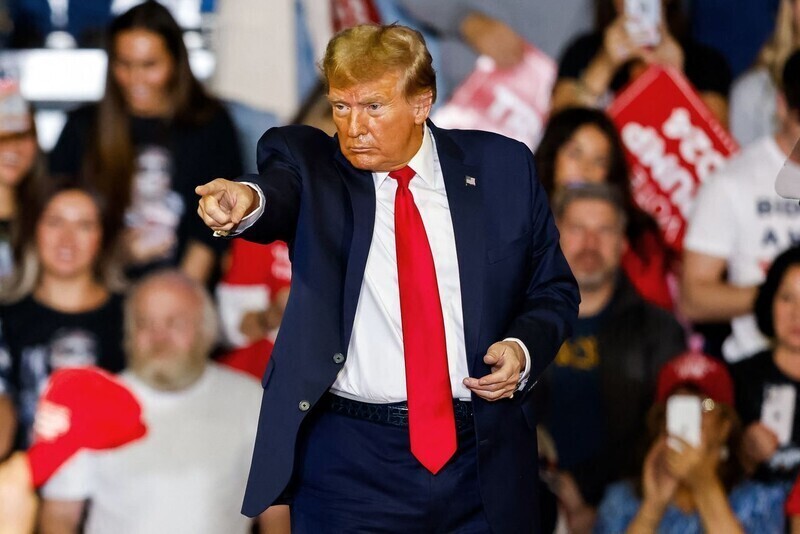hankyoreh
Links to other country sites 다른 나라 사이트 링크
[Editorial] Perilous stakes of Trump’s rhetoric around US troop pullout from Korea

As Trump seeks to return to the White House in the US presidential election this November, he and his allies are stoking the flames of a potential pullout of troops from the Korean Peninsula. These remarks are appearing too frequently, and too consistently, to regard them as bluffing designed to force Korea to contribute more to defense cost-sharing.
Korea will need to thoroughly prepare for every eventuality. Since the withdrawal of US forces from Korea would represent a momentous and earthshaking alteration of the strategic balance on the Korean Peninsula and in East Asia — a balance that has remained in place for more than 70 years, since the Korean War — we need to keep the US from unilaterally altering the status quo until we can find a new understanding.
“US forces on the peninsula, in my view, should not be held hostage to dealing with the North Korean problem because that is not the primary issue for the US,” said Elbridge Colby, principal of the Marathon Initiative and former US deputy assistant secretary of defense for strategy and force development under Trump, in an interview with Yonhap News on Monday.
“South Korea is going to have to take primary, essentially overwhelming responsibility for its own self-defense against North Korea,” Colby went on to say.
Colby even said he wouldn’t rule out South Korea’s nuclear armament, noting that the US wouldn’t protect South Korea from a North Korean nuclear attack if that meant losing “multiple American cities.”
Colby has a major influence on the Trump campaign’s foreign policy and national security policy. The Marathon Initiative, of which he is the co-founder, includes such figures as Matthew Pottinger, who served as deputy national security adviser under Trump.
Since nobody knows who will win the US presidential election, there’s no telling whether Colby’s views will actually form the basis of US policy toward the Korean Peninsula. Nevertheless, his remarks represent a concrete expression of Trump’s “strategic view” on key national security issues that have a direct bearing on Korea’s fate, including the withdrawal of US troops, the OPCON transfer and Korea’s nuclear armament.
That view, in short, is that since the US has to focus on its rivalry with China, Korea should take charge of its own national security. If that means developing its own nuclear weapons, then the US won’t stand in its way. That’s also a departure from Trump’s tendency to regard alliance issues as a matter of financial gain and loss, epitomized in his question “Why would we defend [. . .] a very wealthy country?” in an interview with Time magazine on April 30.
While people have a range of views about US Forces Korea, their exodus from the peninsula would be a calamitous event for South Korea, which would have to go back to the drawing board on its defense policy. Furthermore, South Korea’s nuclear armament would not only scrap our long-held principle of “the denuclearization of the Korean Peninsula” but would obviously also bring about the catastrophic collapse of the nuclear nonproliferation regime around the world. We should be extremely cautious about making radical changes to the status quo.
Please direct questions or comments to [english@hani.co.kr]

Editorial・opinion
![[Editorial] Intensifying US-China rivalry means Seoul must address uncertainty with Beijing sooner than later [Editorial] Intensifying US-China rivalry means Seoul must address uncertainty with Beijing sooner than later](https://flexible.img.hani.co.kr/flexible/normal/500/300/imgdb/original/2024/0517/8117159322045222.jpg) [Editorial] Intensifying US-China rivalry means Seoul must address uncertainty with Beijing sooner than later
[Editorial] Intensifying US-China rivalry means Seoul must address uncertainty with Beijing sooner than later![[Column] When ‘fairness’ means hate and violence [Column] When ‘fairness’ means hate and violence](https://flexible.img.hani.co.kr/flexible/normal/500/300/imgdb/original/2024/0516/7417158465908824.jpg) [Column] When ‘fairness’ means hate and violence
[Column] When ‘fairness’ means hate and violence- [Editorial] Yoon must stop abusing authority to shield himself from investigation
- [Column] US troop withdrawal from Korea could be the Acheson Line all over
- [Column] How to win back readers who’ve turned to YouTube for news
- [Column] Welcome to the president’s pity party
- [Editorial] Korea must respond firmly to Japan’s attempt to usurp Line
- [Editorial] Transfers of prosecutors investigating Korea’s first lady send chilling message
- [Column] Will Seoul’s ties with Moscow really recover on their own?
- [Column] Samsung’s ‘lost decade’ and Lee Jae-yong’s mismatched chopsticks
Most viewed articles
- 1Xi, Putin ‘oppose acts of military intimidation’ against N. Korea by US in joint statement
- 2For new generation of Chinese artists, discontent is disobedience
- 3[Editorial] Transfers of prosecutors investigating Korea’s first lady send chilling message
- 4[Editorial] Intensifying US-China rivalry means Seoul must address uncertainty with Beijing sooner t
- 5[Column] When ‘fairness’ means hate and violence
- 6How K-pop broke the internet — and broke into the US market
- 7[Column] How to win back readers who’ve turned to YouTube for news
- 8AI is catching up with humans at a ‘shocking’ rate
- 9[Editorial] Yoon must stop abusing authority to shield himself from investigation
- 10‘Shot, stabbed, piled on a truck’: Mystery of missing dead at Gwangju Prison